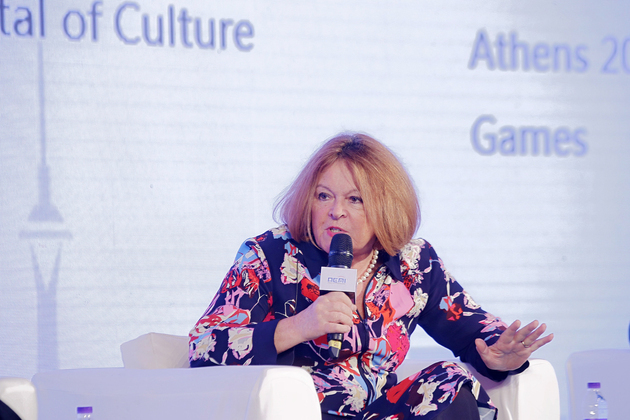
Mary Miller (Photo/Zhang Jian)
Nov. 14 (NBD) – European capitals of culture act as social glues, and cultural events develop trust between its key culture institutions and their audiences, Mary Miller, artistic director of European Capital of Culture 2008, said in her speech themed with What Makes the European Cities Capital of Culture in the 2018 Chengdu Global Events Summit opening on November 13 in Chengdu, Southwest China.
Cultural events need engagement with youth
In 2008, Stavanger2008 as the European capital of culture project kicked off in Norway, Miller directed around 1,000 cultural activities and projects.
Miller believes that talent development is crucial for building a renowned cultural city, and in every culture organisation's budget there should be a ring-fenced amount for the structured development and participation of young artists and makers.
"If we don't identify and train our talents and nurture potential: not just performers, but producers, arts leaders and teachers and culture managers-we will not develop the soul of our cities or make them eventful," Miller noted.
The fast growing digital media greatly impacts the traditional art creation across the world including Norway. As for how to tackle such challenge, Miller pointed out culture organisations must seize every new digital opportunity. There must be opportunities for participation, talent development and engagement with youth, she said.
Leadership, key to cultural city building
In addition to talents development, establishment of cultural and art space as well as cultural communication and collaborations are also of great significance. Serving as general manager and artistic director at the Bergen National Opera, Miller has abundant experience in cultural projects.
In Miller's view, a smart, eventful city must have living buildings which help to bring together the diverse needs of those who make and consume culture in the city and, critically, bring civic pride and a genuine city-wide sense of ownership. These buildings can gather citizens, making them know that they make an essential contribution to a vibrant spirit and sense of place.
Besides, she emphasized a smart city building is not about any individual or company's ego or an architect's kudos, but about creating a living hub for the city.
"That hub needs community spaces, education resources, cafes, casual meeting spaces. It needs to exude welcome to everyone from singing kids to sceptical politicians, from feisty grandmothers to introvert singles. It has to underpin the way we want to live in the future," she explained. Then she took Hansel and Gretel, an opera for children in Norway, as an example of such hub.
As more art and cultural space are created in a city, communication with others will be increasingly important for the city. The Bergen National Opera work with local communities, hotels and handicraft artists as it continues to expand its theatrical style and experience. At the same time, it is enhancing international cooperation in drama and other art fields, and partners with many famous artists.
Miller also mentioned that all actions to build a cultural city need brave, long-sighted, honest, imaginative leadership that has both thick and thin skin: thick skin to stick to the long game of being smart and eventful, with thin-skin enough always to listen and to react with sensitivity.
Regarding the 2018 Chengdu Global Events Summit, Miller noted gatherings like the summit in Chengdu are needed, to share ideas, to talk shop and to dream. "Let's all keep dreaming. It will keep us creative," said Miller.
Email: zhanglingxiao@nbd.com.cn


 川公网安备 51019002001991号
川公网安备 51019002001991号





